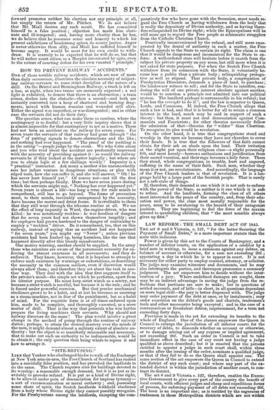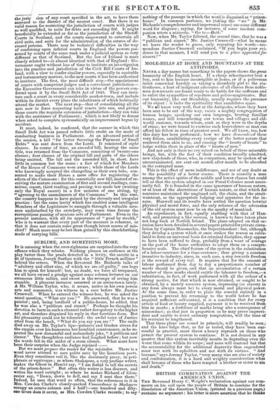LAW REFORM: THE SMALL DEBT ACT OF 1845. THE act
8 and 9 Victoria, c. 127, "for the better Securing the Payment of Small Debts," is a more important statute than the mere title indicates Power is given by this act to the Courts of Bankruptcy, and a number of inferior courts, on the application of a creditor by a brief note in writing, to issue a summons against any debtor, on balance of account or otherwise, for a sum not exceeding 201.; appointing a day in which he is to appear in court. It is not necessary for either party to employ counsel, attorney, or solicitor. The judge may examine witnesses and documents, and be may also interrogate the parties, and thereupon pronounce a summary judgment. The act empowers him to decide without the inter- vention of a jury. Where undefined damages are sought, there may be an indirect advantage in saving the judge from the re- flections that partisans are sure to make ; but in questions of settled accounts, and of bills—in short, in all questions dependent on mere legal skill—the jury is better dispensed with. The judge may order payment of the debt at once, or by instalments ; may order execution on the debtor's goods and chattels, tradesmen's tools and other necessaries being excepted ; and in the case of a contumacious or fraudulent debtor, imprisonment, for a term not exceeding forty days.
Provision is made in the act for extending its benefits to the whole of England. One of the clauses empowers the Queen in Council to enlarge the jurisdiction of all inferior courts for the recovery of debts, to demands whether on account or otherwise, or to damage arising out of any express or implied agreement, not exceeding 20/. Such an order in Council is not to take immediate effect in the case of any court not having a judge qualified as above described; but it is enacted that the persons entitled to appoint a judge in such court shall, within three months after the issuing of the order, nominate a qualified judge, or that if they fail to do so the Queen shall appoint one. The same section of the act empowers the Queen in Council to extend the district of any such court; and where any part of the ex- tended district is within the jurisdiction of another court, to con- tract its district.
The act 8 and 9 Victoria c. 127, therefore, enables the Execu- tive Government to give every part of the country the benefit of local courts, with efficient judges and cheap and expeditious forms of process, for enforcing payment of all debts not exceeding 201. The boon is an important one; as is testified by the eagerness of tradesmen in those Metropolitan districts which are not within
the juris tion of any court specified in the act, to have them annexed to the district of the nearest court. But there is no valid reason for restricting the jurisdiction of courts with judges so well qualified, to suits for debts not exceeding 20/. It might beneficially be extended as far as the jurisdiction of the Sheriff- Courts in Scotland, and the courts empowered to entertain all civil suits, and suits for the administration of the estates of de- "ceased persons. There may be technical difficulties in the way of conferring upon inferior courts in England the powers pos- sessed by courts of the same rank under a judicial system so very different as that of Scotland. But the law of Ireland is more closely related to—is almost identical with that of England : Go- vernment ought without loss of time to institute an investigation into the practice and jurisdiction of the Civil Bill Courts of Ire- land, with a view to confer similar powers, especially in equitable and testamentary matters, to the new courts it has been authorized to institute. The first, the most difficult step—the appointment of courts with competent judges and a convenient jurisdiction— the Executive Government can take in virtue of the powers con- ferred upon it by the Small Debt Act of 1845. They can insti- tute such a court in every considerable market-town, and include within its district every place the inhabitants of which habitually -attend the market. The next step—that of consolidating all the acts now in force respecting local courts into one, and giving those courts the requisite extension of jurisdiction—they can take with the assistance of Parliament ; which is not likely to demur when asked to complete systematically an improvement begun by accident.
It must, indeed, be confessed, that the manner in which this Small Debt Act was passed reflects little credit on the mode of conducting business in Parliament. At an advanced period of the session, a bill "for better Securing the Payment of Small Debts" was sent down from the Lords. It consisted of eight clauses. In course of time, an amended bill, bearing the same title, was returned from the Commons, consisting of twenty-one clauses ; four clauses of the original bill and parts of the others being omitted. The bill and the amended bill, in short, have little in common but the name : a fact of which few Members of the House of Commons were aware ; while those of the Lords who knowingly accepted the changeling as their own babe, con- sented to make their House a mere office for registering the edicts of the Commons : for this essentially new bill, instead of re- ceiving the mature examination of first and second readings, com- mittee, report, third reading, and passing, was made law (waiting only the Royal assent) in a few minutes of one sitting, by "agreeing to the amendments of the Commons." In this case, the country happens to have gained by the slovenly and irregular practice : but the same laxity which has enabled some intelligent Members of the Legislature to smuggle through a valuable mea- sure undisturbed by the crotchety, may some time favour the surreptitious passing of noxious acts of Parliament. Even in the present instance, with all its appearance of " good by stealth," who is to warrant that every part of the measure is coherent, or that it does not contain some great though latent source of mis- chief? Much more may be lost than gained by this chuckfarthing mode of carrying bills.



























 Previous page
Previous page